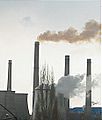Environmental economics facts for kids
Environmental economics is a part of economics that studies how our economy and the environment affect each other. It looks at problems like pollution and how we use natural resources like clean water and fresh air.
These resources are super important, but they are also limited. For example, there's only so much clean water available. Sometimes, people treat these resources as "free" things that anyone can use without limits. But when there are no rules, these resources can get used up too quickly or become very polluted.
Contents
Why We Need Environmental Economics
When people use natural resources without thinking about the cost to others or the environment, it can cause problems. Imagine a factory that pollutes a river. The factory saves money by not cleaning its waste, but the people living downstream suffer from dirty water. This is called an externality, which means a cost or benefit that affects someone who wasn't directly involved in the activity. In this case, it's a negative externality.
Another problem is the free rider problem. This happens when some people benefit from a resource without paying their fair share for it. For example, if everyone benefits from clean air, but only a few people pay to reduce pollution, the "free riders" get the clean air without contributing.
Turning Resources into Economic Goods
Environmental economics suggests that one way to solve these problems is to treat natural resources more like "economic goods." This means giving them a value in the market. When something has a price or a cost, people tend to use it more carefully.
For example, a tax on pollution can make factories pay for the pollution they create. This gives them a reason to find cleaner ways to produce things. It makes the cost of pollution part of their business expenses.
Rules and Property Rights
Good rules and clear property rights are also very important. These help decide who can use a resource and how. For example, laws can set limits on how much pollution a company can release. This helps make sure that natural resources are used fairly and sustainably, meaning they will be available for future generations too.
How Environmental Economics Helps
Environmental economics helps us understand the true costs of using our planet's resources. It looks for ways to:
- Reduce pollution: By making polluters pay, it encourages them to pollute less.
- Protect natural resources: It helps create systems where resources are valued and used wisely.
- Promote sustainability: It aims for economic growth that doesn't harm the environment in the long run.
It uses tools like taxes, permits, and regulations to encourage businesses and people to make choices that are better for the environment. It's all about finding a balance between economic growth and protecting our planet.
Images for kids
See also
 In Spanish: Economía ambiental para niños
In Spanish: Economía ambiental para niños
 | Isaac Myers |
 | D. Hamilton Jackson |
 | A. Philip Randolph |





